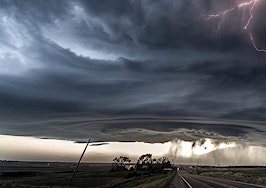- Shopping for a home during the winter can reveal hidden surprises. Aside from less competition, buyers can find lower prices and motivated sellers, as well as more attention from their agents.
- Buyers looking for a home during the winter months might experience lower inventory and inclement weather.
- Looking at details -- such as insulation, heating and plumbing -- during the winter can be a real quality test for the home's nooks and crannies.
When you think of Christmas shopping, the first thing that comes to mind probably isn’t buying a home — and it’s probably not the first thing that comes to your clients’ minds, either.
However, Santa’s busy season can be an excellent time to house shop. Below are a few reasons that it’s advantageous for your clients to house hunt now. But first, let’s talk about the downside of winter home shopping and leave the pros for the end, so they will be fresh in your clients’ minds.
The cons
1. Lower inventory
Winter can mean even slimmer pickings for homebuyers. The inventory of homes on the market can often reach its lowest point in December.
Why? Because of the low activity during the winter months, many real estate agents will advise sellers against listing their homes during this time and tell them to delay until at least spring instead.
That means that the housing market will primarily be made up of leftovers from the busier summer and fall months, as well as foreclosures and short sales.
[Tweet “Home inventory often reaches its lowest point in December, which means less competition.”]
2. Inclement weather
House-hunting in the winter can be a bit of a pain, especially if you live up north. Heavy snow can make it difficult to assess a home’s curb appeal and landscape, and it’s just plain annoying to drive through.
The pros
On the other hand, there are more pros that you might not have thought of, much less discussed with your clients.
1. Less competition
Just like the weather, homebuying season is its hottest during the summer months. All of that competition for homes can put a lot of pressure on buyers to make an offer quickly for fear of losing out on the home of their dreams.
With the decrease in buyer competition, you’re less likely to end up in a bidding war.
2. Lower prices
The drop in competition and the drop in temperature are also often followed by a drop in prices. Don’t expect any Black Friday-level discounts, but every little bit helps, right?
3. Motivated sellers
In addition to price, the low activity on the market can also mean that sellers are more willing to negotiate with buyers on things such as closing costs, closing date and terms of the sale.
The homes that are for sale during the winter months are often ones that didn’t get picked up in the busier season, so sellers might be eager just to get the deal closed before the new year so they can move on.
[Tweet “Low market activity can create motivated sellers who are eager to move on.”]
4. Improved client services
As the client load tapers off for agents and mortgage lenders, they’ll be able to devote even more time to clients. And what client doesn’t want as much individual attention as possible?
5. Pre-inspection red flags
Want to know how well a home’s heating and plumbing works? What about the insulation? Looking closely at these details is a true quality test for many homes because during the winter months these issues can’t be hidden or ignored.
When you’re touring homes during the winter, you can put your hand up to the windows to see if they’re letting cold air in, or you can check if the thermostat matches up to the internal temperature of a home.
Even if you’re house-hunting in a warm area, you’ll want to make sure the insulation of the home will be able to stand up to the test of the hot summer months, so you’re not sweating your purchase later on.
Just like with any buying season, winter has its pros and cons. However, if you’re willing to brave the cold weather, then you might end up with a steal of a deal and a new place to call home, just in time for the holidays.
Sharon Voss is the president of the Orlando Regional Realtor Association. Connect with ORRAFL on Facebook or Twitter.




